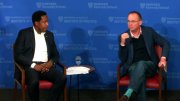On the morning of January 6, 2021, Mick Mulvaney met with new members of Congress in the Capitol. Mulvaney had served in the Trump administration since February 2017, first as director of the Office of Management and Budget, then as acting White House chief of staff from January 2019 to March 2020, and finally as special envoy to Northern Ireland. As the President’s rally against the election outcome devolved and whispers of a citywide lockdown spread, he flew home to South Carolina. There, his daughters asked him, “What are you going to do?” That evening, Mulvaney resigned.
“I didn’t quit at the time because I thought the President did anything illegal,” said Mulvaney Tuesday evening at the Harvard Kennedy School’s Institute of Politics. “I quit because he failed to meet my expectations as a boss…. That was a time when we needed the President to be the President, and he wasn’t.”
Three years later, Mulvaney says that listening to his former colleagues’ testimonies to the House January 6 committee “makes me change my opinion about the President’s conduct on January 6.” He now wonders “whether or not [Trump] did anything illegal on that particular day,” such as conspiring with paramilitary groups. Before, Mulvaney thought Trump acted legally, but when presented with new information, he questioned his original beliefs. But Mulvaney fears that most Americans are unwilling to reconsider their political positions when faced with contradicting facts.
Following four years in the South Carolina General Assembly, six years in the House of Representatives, and four years in Donald Trump’s administration, Mulvaney has left the public sector. Now, he wants to promote civil discourse—to help people disagree respectfully and forge fact-informed opinions. So far, that mission has failed. He said that Harvard is one of very few American colleges that have invited him to speak, multiple universities turned down his idea to start an institute for civil discourse (with $10 million of pledged donations), and CBS News fired him from his on-air contributor role (there, he “tried to restore integrity” to the media).
Describing his political career, Mulvaney highlighted the times when he convened groups that would debate, disagree, and compromise. During his 15 months as Trump’s acting chief of staff, Mulvaney said he was less focused on political outcomes than on ensuring that the President was well informed. His focus was, “Who is there? And are these sane people?” When someone that Mulvaney considered unreliable, like Peter Navarro (director of trade and manufacturing policy), briefed Trump, Mulvaney “made sure that somebody else was there to balance out what I consider to be his craziness.” Bringing together experts from different perspectives, Mulvaney hoped, helped the President understand the wide range of options and come to a decision.
Mulvaney learned about convening and debating while serving in the House of Representatives. In 2015, he cofounded the House Freedom Caucus. To determine who could enter the caucus, the cofounders devised “a sort of a litmus test”: members had to have voted both with and against the GOP leadership. “I’m interested in dealing with the people who can be swayed,” he said, “You could negotiate with them.” That membership method (initially) excluded far-right House members like Steve King and Louie Gohmert, Mulvaney said.
Now, his feelings toward the caucus have shifted. During the Trump administration, the most ideologically conservative House caucus figured out that “there was a lot of money to be made in outrage,” he said. The caucus, in his opinion, is now “a machine for outrage” and no longer looks like the group he helped found: “I hate to see something that I helped start turn into something it’s not.”
In his introductory remarks, cochair of the IOP Conservative Coalition Michael Oved ’25 said, “The electorate and our politicians seem more divided than ever.” Although many people argue that politicians and their desire to stoke outrage are responsible for the gap, Mulvaney blamed the populace. “Government is always a trailing indicator, not a leading indicator,” he said. “The reason Washington looks like it does is [because] the country looks like it does.” Some factors responsible for the divide, he said, include the separation of rich and poor Americans and the loss of shared culture.
Above all, Mulvaney argued, America is being torn apart because people refuse to consider new perspectives. News networks are now “for entertainment, not for education,” he continued, and Americans “watch news for the purpose of having our own pre-existing beliefs affirmed.”
Such self-sorting into silos is not confined to the airwaves. In a discussion with University of California Los Angeles students, Mulvaney related, one student expressed her surprise that he was friends with ABC White House correspondent Jonathan Karl. After the Trump administration ended, despite their differing politics, the pair traveled together and spoke to groups. The center-left student asked Mulvaney how he could be friends with Karl if “you disagree with him on a lot of things,” and remarked that she would “never be seen…in public” with a conservative classmate. Mulvaney told the IOP audience, “We are living in a world where it seems like no one wants to change their mind about anything, and that frightens me because we won’t be able to deal with all the other stuff that does keep me up at night: the debt, Social Security, foreign policy.”
Reflecting on his government service, Mulvaney thinks back to January 6, 2021, and wonders how the day would have played out had he still been chief of staff. “After I left, apparently the sane people didn’t get in the room anymore,” he said. If President Trump had heard from a wide range of people, would he have instead condemned the rioters? “I’d like to think that it would have been different if I was in the building,” Mulvaney said. “I was proud to work for the guy, and at the same time, I was proud that I quit on January 6.”









